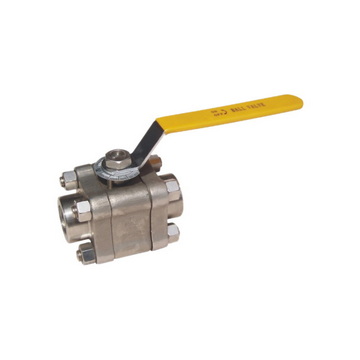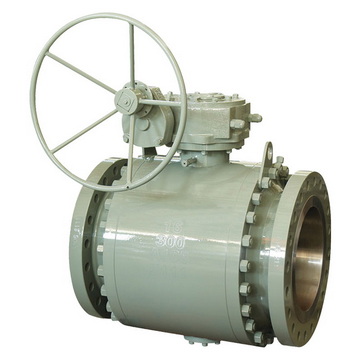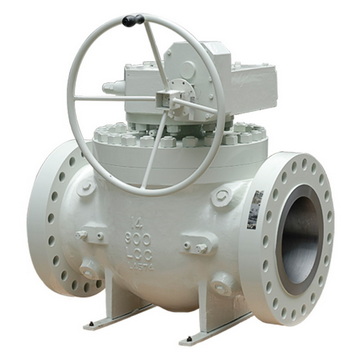How ERP-Driven Production Enhances Stainless Steel Ball Valve Quality?
Content Menu
● Understanding Stainless Steel Ball Valves and Their Manufacturing Complexity
● What is ERP and Why Is It Crucial for Valve Manufacturing?
● ERP-Driven Workflow in Stainless Steel Ball Valve Production
● Driving Superior Quality with ERP-Enabled Controls
● Optimizing Supply Chain and Inventory for Competitive Advantage
● Supporting OEM Services with ERP Customization
● Overcoming ERP Implementation Challenges
● FAQ
>> 1. What types of stainless steel ball valves can benefit the most from ERP-driven production?
>> 2. How does ERP improve the quality assurance process specifically for stainless steel ball valves?
>> 3. Can ERP systems handle customized OEM valve orders with specific client requirements?
>> 4. What challenges might stainless steel ball valve manufacturers face in implementing ERP?
>> 5. How does ERP contribute to supply chain efficiency in valve manufacturing?
In today's competitive manufacturing landscape, producing high-quality products efficiently is no longer optional — it's a business imperative. This is especially true for manufacturers of stainless steel ball valves, which serve critical roles across various demanding industries such as oil and gas, seawater desalination, offshore drilling platforms, chemical processing, and more. These valves require precision engineering, rigorous quality control, and reliable production processes to ensure they meet stringent operational standards.
To meet these challenges, many valve manufacturers are integrating Enterprise Resource Planning (ERP) systems into their production workflows. ERP-driven production not only streamlines operations but also significantly enhances product quality, reduces waste and defects, and improves responsiveness to customers and partners. This article delves into the transformative impact of ERP on stainless steel ball valve manufacturing, focusing on floating ball valves, trunnion (ear-axis) ball valves, and top-entry ball valves. We will illustrate the benefits of ERP across quality control, supply chain management, OEM services, and overall production efficiency.

Understanding Stainless Steel Ball Valves and Their Manufacturing Complexity
Stainless steel ball valves are widely favored in industries where corrosion resistance, durability, and leak-free performance are paramount. Their design variety—including floating ball valves, trunnion-mounted valves, and top-entry valves—accommodates different usage conditions, from high-pressure oil and natural gas pipelines to corrosive seawater treatment systems.
The manufacturing process of these valves involves multiple complex steps:
- Precision casting or forging of valve bodies and balls using high-grade stainless steel alloys.
- Machining to achieve tight tolerances on sealing surfaces and critical dimensions.
- Welding and assembly that require specialized techniques to ensure leak-tight joints.
- Rigorous testing including pressure, torque, and leak tests.
Each stage is sensitive to variations in material quality, operator skill, and environmental conditions. Without a systematic approach, defects may go undetected, or production inefficiencies can arise, prolonging lead times and increasing costs.
What is ERP and Why Is It Crucial for Valve Manufacturing?
Enterprise Resource Planning (ERP) systems integrate all facets of an organization's operations into a single cohesive digital platform. This commonly includes modules for procurement, inventory, production scheduling, quality management, finance, and customer relationship management (CRM).
For stainless steel ball valve manufacturers, ERP systems bring the following transformational advantages:
- Centralized Data Access: Real-time data on production schedules, inventory levels, and quality metrics are available across departments, eliminating silos.
- Process Standardization: ERP enforces standardized workflows and quality checks, leading to consistent product quality.
- Traceability and Compliance: Each valve's production history, from raw materials to inspection results, is fully documented and easily traceable for audits or recalls.
- Cost Efficiency: Automation of routine tasks reduces manual errors, lowers inventory costs, and optimizes resource utilization.
- Customer Transparency: Clients, including international OEM partners, gain visibility into order statuses and quality reports.
By coordinating these processes, ERP systems directly contribute to better quality outputs and more efficient manufacturing cycles.
ERP-Driven Workflow in Stainless Steel Ball Valve Production
The journey of a stainless steel ball valve through an ERP-supported plant begins with order receipt and extends all the way to delivery and after-sales service. Typical workflow steps enhanced by ERP include:
1. Order Capture and Specification Management: Orders from overseas brand owners, wholesalers, or producers are entered with detailed valve specifications, material grades, certification requirements, and delivery timelines. ERP consolidates order data and matching production capacity.
2. Material Requirement Planning (MRP): The system accurately forecasts raw material needs, placing automated purchase requests for stainless steel billets, seals, and other components. This automates supplier communication and ensures availability while avoiding overstocking.
3. Production Scheduling: ERP schedules machining, welding, assembly, and inspection tasks across workshops. It adjusts work orders dynamically based on real-time shop floor data, optimizing throughput and minimizing machine downtime.
4. Quality Control Integration: At every critical step, ERP triggers inspection protocols such as dimensional verification, surface finish evaluation, pressure tests, and leak detection. The system collects and stores quality data, allowing immediate identification and handling of defects.
5. Inventory and Warehouse Management: ERP tracks semi-finished and finished valve inventories with precision. This ensures the correct valve variants are stored properly and picked promptly for shipping or further processing.
6. Shipping, Documentation, and Compliance: ERP generates vital export documentation, quality certificates (ISO, API, NACE), and customer reports. It tracks shipping logistics to ensure on-time delivery to global clients.
7. After-Sales Service and Warranty Management: The system maintains comprehensive records of each valve delivered, including service history and warranty claims. This supports prompt after-sales support and strengthens client relationships.
By integrating these steps seamlessly, ERP empowers manufacturers to produce stainless steel ball valves at consistently high quality and with predictable lead times.

Driving Superior Quality with ERP-Enabled Controls
Superior quality is the cornerstone of stainless steel ball valve manufacturing, especially for critical applications like subsea oil extraction or seawater desalination plants, where valve failure can lead to operational disasters. ERP systems enhance quality management in several ways:
- Standardized Inspection Protocols: Instead of relying on individual operator judgment, the ERP enforces inspection criteria at each production stage. This reduces variability and human error.
- Defect Traceability: Each valve is linked to its raw materials, batch numbers, machine IDs, and operator logs, recorded within the ERP. This allows rapid root cause analysis if an issue is detected later.
- Non-Conformity Alerting: Real-time quality data analytics within ERP can automatically flag anomalies, alerting quality managers to intervene before defective valves proceed further.
- Documentation for Certifications: Complete digital records make it easier to obtain and maintain certifications such as ISO 9001 and API standards, reassuring overseas OEM partners of compliance.
- Continuous Improvement Feedback: Quality trends over time are tracked, supporting Six Sigma or Kaizen initiatives to reduce defect rates systematically.
With these ERP-enabled controls, manufacturers achieve improved product reliability, lower scrap rates, and enhanced customer trust.
Optimizing Supply Chain and Inventory for Competitive Advantage
Manufacturing stainless steel ball valves to fulfill OEM contracts with international brands demands a highly responsive supply chain. ERP software addresses this by:
- Supplier Performance Monitoring: ERP tracks supplier delivery punctuality, quality, and pricing, enabling strategic sourcing decisions. Poor performing vendors can be replaced or managed proactively.
- Inventory Optimization: Automatically adjusting procurement quantities and reorder points prevents raw material stockouts or excess inventory that tie up capital.
- Logistics Coordination: Integration with shipping and customs documentation reduces freight delays and ensures valves reach overseas clients on time.
- Demand Forecasting: ERP analyzes historical sales and seasonal trends to better plan production capacity and material orders.
This strategic supply chain control translates to shorter delivery cycles and stronger market competitiveness.
Supporting OEM Services with ERP Customization
OEM customers often require valves with specific customizations—unique dimensions, special coatings, or branded packaging. ERP systems facilitate these complex services by:
- Managing detailed customer specifications and storing design variations for repeatability.
- Coordinating tailor-made production workflows that ensure custom parts are prioritized and quality checked.
- Tracking costs separately for customized orders, enabling accurate pricing and profitability analysis.
- Generating comprehensive technical documents and certificates in the required formats for each OEM partner.
This flexibility positions the manufacturer as a preferred supplier for esteemed international valve brands and distributors.
Overcoming ERP Implementation Challenges
While ERP offers immense benefits in stainless steel ball valve manufacturing, initial adoption can face obstacles such as:
- High Upfront Investment: Software licenses, hardware, and consulting services require capital expenditure. However, the ROI over time, through efficiency gains and quality improvements, is substantial.
- Employee Training: Operators and managers must adapt to new digital workflows. Continuous training programs and involving staff early can smooth the transition.
- System Integration: Linking ERP with legacy machines, CNC tools, and measurement equipment demands technical expertise but can be tackled with phased deployment and middleware solutions.
Proper change management and vendor support are key success factors.
Conclusion
Integrating ERP into stainless steel ball valve manufacturing capabilities is no longer a luxury but a strategic necessity. From raw material procurement to quality assurance, production scheduling, and customer service, ERP systems provide the digital backbone that drives excellence. By enabling real-time monitoring, standardizing workflows, and providing full traceability, ERP elevates product quality, reduces operational waste, and improves delivery reliability.
For factories specializing in floating, ear-axis, and top-entry ball valves serving demanding industries such as oil and gas, seawater desalination, and offshore drilling, ERP-driven production becomes a clear competitive advantage. It empowers manufacturers to meet the stringent quality expectations of international OEM partners and distributors while responding flexibly to market needs.
If you aim to enhance your stainless steel ball valve quality and streamline your production process through ERP-driven manufacturing, connect with us today. Our expertise in valve design, development, and ERP integration can help you deliver superior products that exceed global standards.

FAQ
1. What types of stainless steel ball valves can benefit the most from ERP-driven production?
All major types—including floating ball valves, trunnion-mounted (ear-axis) ball valves, and top-entry ball valves—benefit from ERP integration by enabling precise production control and quality assurance.
2. How does ERP improve the quality assurance process specifically for stainless steel ball valves?
ERP standardizes inspection procedures, provides real-time defect alerts, maintains comprehensive traceability of materials and process parameters, and facilitates compliance documentation for international standards.
3. Can ERP systems handle customized OEM valve orders with specific client requirements?
Yes, ERP modules can manage custom valve specifications, adjust production workflows accordingly, and generate tailored quality and shipping documentation, streamlining OEM services.
4. What challenges might stainless steel ball valve manufacturers face in implementing ERP?
Challenges include high initial costs, employee resistance to workflow changes, and integration complexities with existing equipment; these can be mitigated through proper planning, training, and phased implementation.
5. How does ERP contribute to supply chain efficiency in valve manufacturing?
ERP automates supplier management, optimizes inventory control, monitors logistics, and supports demand forecasting, leading to reduced lead times and lower operational costs.
Hot tags: ERP Driven Production In Stainless Steel Ball Valve Manufacturing, How ERP Improves Stainless Steel Ball Valve Quality, ERP System For Stainless Steel Ball Valve Production, Benefits Of ERP In Stainless Steel Ball Valve Manufacturing, ERP Integration For Stainless Steel Ball Valve Quality Control, ERP Solutions For Stainless Steel Ball Valve Industry, Enhancing Stainless Steel Ball Valve Performance With ERP, ERP Based Manufacturing Process For Stainless Steel Ball Valves, ERP And Quality Assurance In Stainless Steel Ball Valve Production, How ERP Optimizes Stainless Steel Ball Valve Manufacturing Efficiency